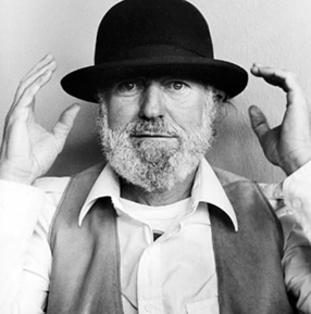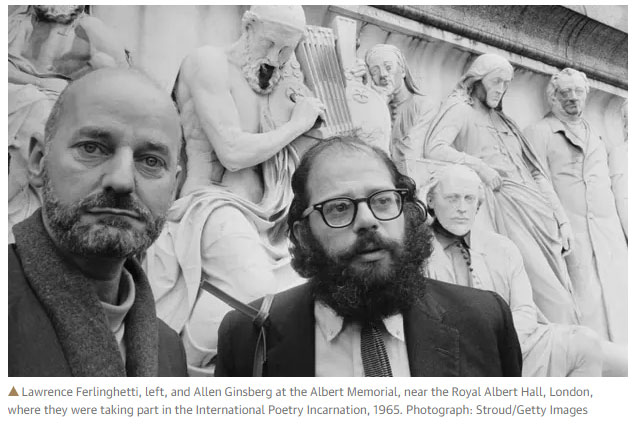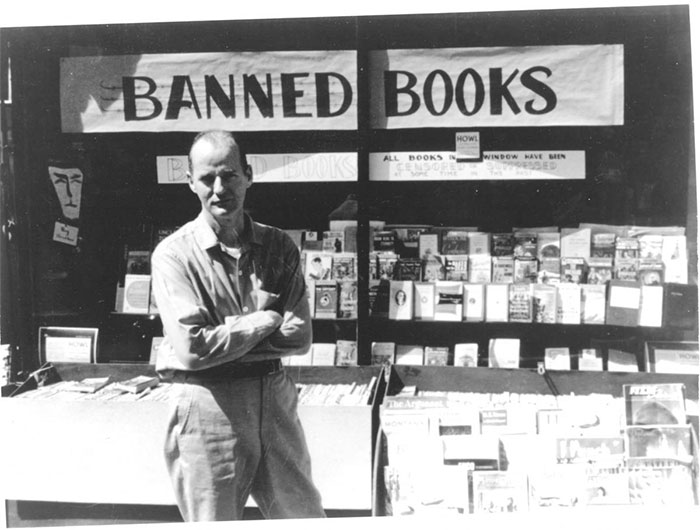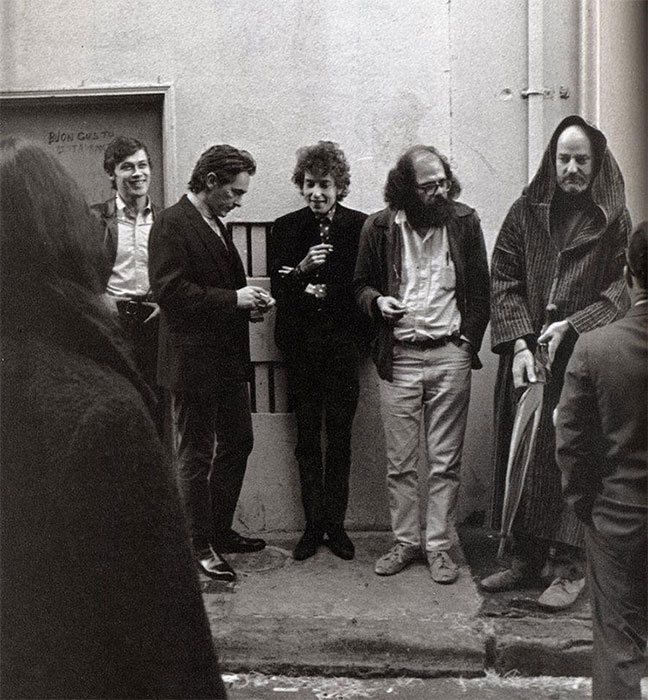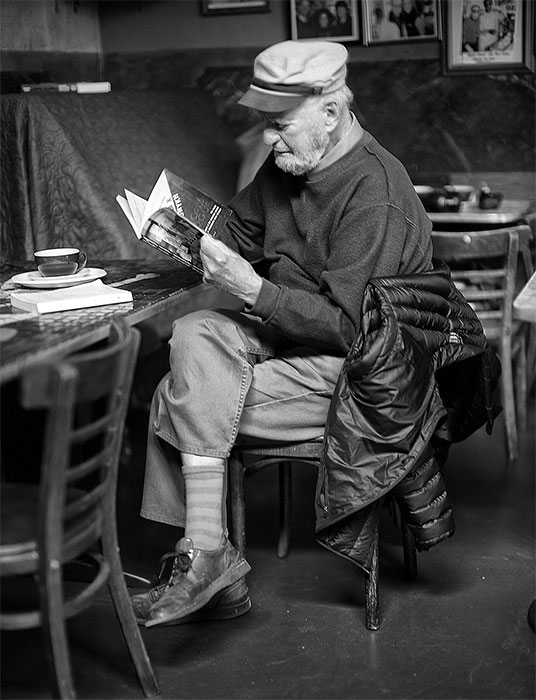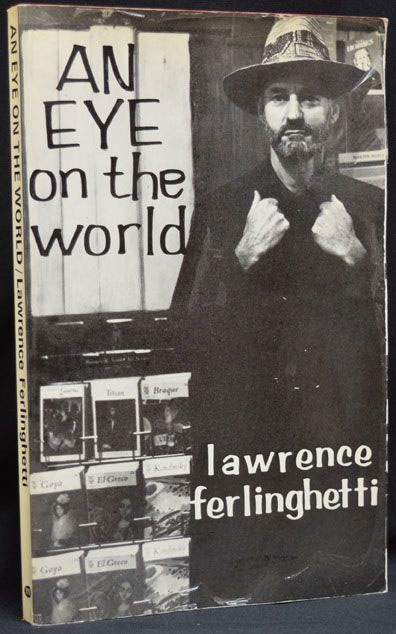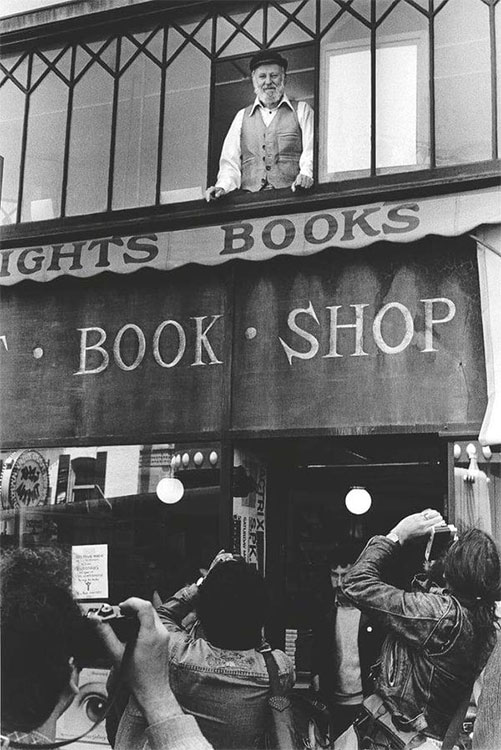
On March 24, 1919, Lawrence Ferlinghetti was born in Yonkers, New York. After spending his early childhood in France, he received his BA from the University of North Carolina, an MA from Columbia University, and a PhD from the Sorbonne.
He is the author of more than thirty books of poetry, including Poetry as Insurgent Art (New Directions, 2007); Americus, Book I (New Directions, 2004); A Far Rockaway of the Heart (New Directions, 1997); and A Coney Island of the Mind (New Directions, 1958). He has translated the works of a number of poets, including Nicanor Parra, Jacques Prevert, and Pier Paolo Pasolini. In addition to poetry, he is also the author of more than eight plays and three novels, including Little Boy: A Novel (Doubleday, 2019), Love in the Days of Rage (Overlook, 1988), and Her (New Directions, 1966).
In 1953, Ferlinghetti and Peter Martin opened the City Lights bookstore in San Francisco, California, helping to support their magazine City Lights. Two years later, they launched City Lights Publishers, a book-publishing venture, which helped start the careers of many alternative local and international poets. In 1956, Ferlinghetti published Allen Ginsberg’s book Howl and Other Poems, which resulted in his being arrested by the San Francisco Police for publishing “obscene work” and a subsequent trial that gained international attention. At the end, the judge concluded that Howl had “some redeeming social importance” and “was not obscene,” and Ferlinghetti prevailed. City Lights became known as the heart of the “Beat” movement, which included writers such as Kenneth Rexroth, Gary Snyder, Allen Ginsberg, and Jack Kerouac, crediting Ferlinghetti with having helped spark the San Francisco literary renaissance of the 1950s and the “Beat” movement that followed, although he does not consider himself a “Beat” poet.
About his work, the critic Barbara Berman wrote, “Ferlinghetti is a tonic for a world thirsting for the loving outrage and energetic reverence that helped reignite and sustain the enterprise of bard-fueled citizenship.”
In 1994, San Francisco renamed a street in Ferlinghetti’s honor, and in 1998, he was named the first poet laureate of San Francisco. He is the recipient of many international awards and honors, including the National Book Critics Circle Ivan Sandrof Award for Contribution to American Arts and Letters, the Robert Frost Memorial Medal, and the National Book Foundation’s Literarian Award, presented for “outstanding service to the American literary community,” among others. In 2003, he was elected as a member of the American Academy of Arts and Letters, and in 2007, he was named Commandeur of the French Order of Arts and Letters.
He died on February 22, 2021, in San Francisco, California.
Selected Bibliography
Poetry
Time of Useful Consciousness (New Directions, 2012)
Poetry as Insurgent Art (New Directions, 2005)
How to Paint Sunlight: Lyric Poems and Others, 1997-2000 (New Directions, 2001)
San Francisco Poems (City Lights, 2001)
A Far Rockaway of the Heart (New Directions, 1998)
These Are My Rivers: New and Selected Poems, 1955-1993 (New Directions, 1993)
When I Look at Pictures (Peregrine Smith Books, 1990)
Wild Dreams of a New Beginning (New Direction, 1988)
Inside the Trojan Horse (Lexikos, 1987)
Over all the Obscene Boundaries: European Poems and Transitions (New Directions, 1985)
Endless Life: Selected Poems (New Directions, 1980)
Landscapes of Living and Dying (New Directions, 1979)
Open Eye, Open Heart (New Directions, 1973)
Back Roads to Far Places (New Directions, 1971)
The Mexican Night (New Directions, 1970)
Tyrannus Nix? (New Directions, 1969)
The Secret Meaning of Things (New Directions, 1969)
Routines (New Directions, 1964)
Unfair Arguments with Existence (New Directions, 1963)
Starting from San Francisco (New Directions, 1961)
A Coney Island of the Mind (New Directions, 1958)
Pictures of the Gone World (City Lights, 1955)
Poetry as Insurgent Art [I am signaling you through the flames]
I am signaling you through the flames.
The North Pole is not where it used to be.
Manifest Destiny is no longer manifest.
Civilization self-destructs.
Nemesis is knocking at the door.
What are poets for, in such an age?
What is the use of poetry?
The state of the world calls out for poetry to save it.
If you would be a poet, create works capable of answering the challenge of apocalyptic times, even if this meaning sounds apocalyptic.
You are Whitman, you are Poe, you are Mark Twain, you are Emily Dickinson and Edna St. Vincent Millay, you are Neruda and Mayakovsky and Pasolini, you are an American or a non-American, you can conquer the conquerors with words….
A Far Rockaway of the Heart, 2
Driving a cardboard automobile without a license
at the turn of the century
my father ran into my mother
on a fun-ride at Coney Island
having spied each other eating
in a French boardinghouse nearby
And having decided right there and then
that she was for him entirely
he followed her into
the playland of that evening
where the headlong meeting
of their ephemeral flesh on wheels
hurtled them forever together
And I now in the back seat
of their eternity
reaching out to embrace them
A Coney Island of the Mind, 11
The wounded wilderness of Morris Graves
is not the same wild west
the white man found
It is a land that Buddha came upon
from a different direction
It is a wild white nest
in the true mad north
of introspection
where ‘falcons of the inner eye’
dive and die
glimpsing in their dying fall
all life’s memory
of existence
and with grave chalk wing
draw upon the leaded sky
a thousand threaded images
of flight
It is the night that is their ‘native habitat’
these ‘spirit birds’ with bled white wings
these droves of plover
bearded eagles
blind birds singing
in glass fields
these moonmad swans and ecstatic ganders
trapped egrets
charcoal owls
trotting turtle symbols
these pink fish among mountains
shrikes seeking to nest
whitebone drones
mating in air
among hallucinary moons
And a masked bird fishing
in a golden stream
and an ibis feeding
‘on its own breast’
and a stray Connemara Pooka
(life size)
And then those blown mute birds
bearing fish and paper messages
between two streams
which are the twin streams
of oblivion
wherein the imagination
turning upon itself
with white electric vision
refinds itself still mad
and unfed
among the hebrides

